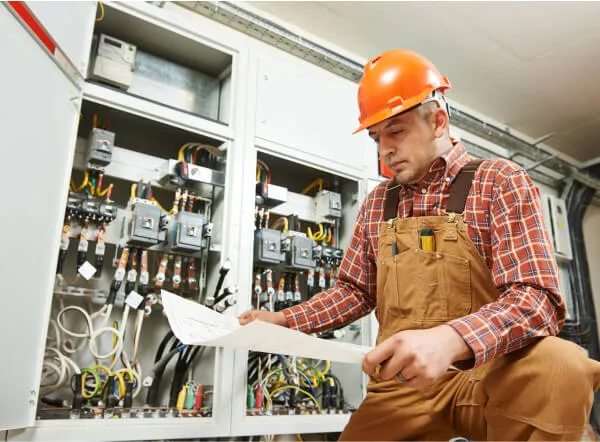Electrical Equipment Installation and Repair

Electrical installers and repairers are needed to fix and maintain all kinds of devices and systems that use electricity. Learn about this field, including job duties, employment outlook, earning potential and degree requirements.
<h2 id="section---IsElectricalEquipmentInstallationAndRepairForMe">Is Electrical Equipment Installation and Repair for Me?</h2>
<h3 id="section---CareerSummary">Career Summary</h3>
<p>Electricity is used virtually everywhere, so there is a lot of variability within the electrical installation and repair profession. You might work in the commercial, residential, industrial or government sector, and many electrical equipment workers specialize in particular systems or components. For instance, you could focus on computers, <a href="https://learn.org/articles/What_is_Mechatronics.html">mechatronics</a> or mechanical systems, or you might work with programmable logic controllers, green energy equipment or fluid piping systems. In addition to installing and repairing electrical systems, your tasks may include testing for equipment malfunctions or inspecting electrical components. Field technicians usually work on location, while bench technicians are based at a service center or repair shop.
</p>
<h3 id="section---EmploymentOutlookAndSalaryStatistics">Employment Outlook and Salary Statistics</h3>
<p>The U.S. Bureau of Labor Statistics (BLS) projected that electrical installation and repair workers would experience a one percent increase in jobs from 2012-2022, although the actual demand for each specialization may vary (<i>www.bls.gov</i>). In addition, you'd be likely to find more favorable job prospects if you have at least an associate's degree and relevant certification. Income also varies substantially. The BLS reported that in May 2013, commercial and industrial equipment workers earned a mean annual wage of $54,230, powerhouse and substation installers took home $68,270, electric motor and tool repairers received $40,500, and electrical installers of transportation equipment made $53,970.
</p>
<h2 id="section---HowCanIWorkInElectricalEquipmentInstallationAndRepair">How Can I Work in Electrical Equipment Installation and Repair?</h2>
<h3 id="section---EducationPrograms">Education Programs</h3>
<p>You'd need to have a solid understanding of electrical systems to work in installation and repair jobs. Many employers prefer to hire applicants who have an associate's degree, and some jobs may require certification as well. An <a href="https://learn.org/articles/Electrical_Technology_Associates_Degree.html">associate's degree in electrical technology</a> can be a good choice for a career in electrical equipment installation and repair. Programs explore technical physics, programmable logic controllers and <a href="https://learn.org/articles/What_Career_Options_are_in_the_Field_of_Digital_Electronics.html">digital electronics</a>. Some <a href="https://learn.org/articles/Applied_Electrical_Technology_Associates_Degree.html">associate's degrees in applied electrical technology</a> provide an option to specialize. In addition to electrical system coursework, there may be opportunities for internships and certification preparation. If you want to get started working right away, there are also diploma programs that teach basic skills like wiring, voltage control and circuit analysis for working with electrical equipment in residential, commercial or industrial settings.
</p>
<h3 id="section---Certification">Certification</h3>
<p>Professional organizations, such as the International Society of <a href="https://learn.org/articles/Certified_Electronics_Technician_Career_Profile_Employment_Outlook_and_Education_Requirements.html">Certified Electronics Technicians</a>, offer several certifications, including multimedia systems, appliance services, and a journeyman certification that encompasses medical, radar, industrial and communication systems.
</p>
<h3 id="section---NecessarySkills">Necessary Skills</h3>
<p>In addition to your manual skills, as an <a href="https://learn.org/articles/How_Do_I_Become_an_Electronics_Repair_Technician.html">electrical repair worker</a> you'd need to know how to read schematics and manuals, troubleshoot problems and use good safety practices. Attention to detail, manual dexterity and good communication skills are also important.</p>


.svg)